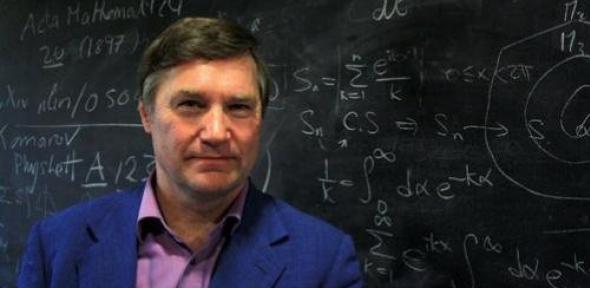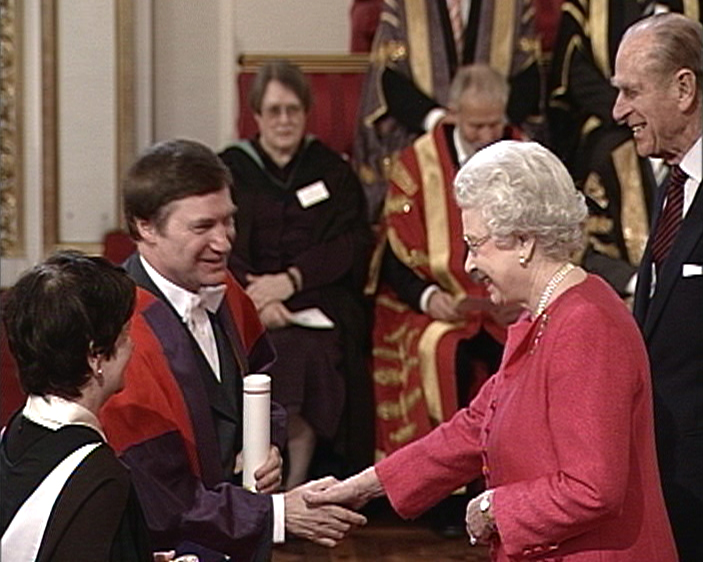
The Faculty is deeply saddened by the death of John D Barrow FRS, Professor of Mathematical Sciences, on 26th September 2020. He was a renowned cosmologist and mathematical physicist who also had a profound influence on the public understanding of science through his outreach lectures, his many popular science books, and his leadership of the Millennium Mathematics Project.
John Barrow was Professor of Mathematical Sciences, Director of the Millennium Mathematics Project, and a Fellow of Clare Hall. Amongst his colleagues in the Faculty of Mathematics and Clare Hall, he was held in high regard by the many who benefitted from his wisdom and insight, and we shall feel the loss of his warm and engaging presence, which is remembered with great affection.
John Barrow grew up in Wembley and attended Ealing Grammar School in a part of London that he described as “not conducive to observational astronomy”. After obtaining a degree in mathematics and physics from Durham University in 1974, he completed his doctorate in astrophysics at the University of Oxford under the supervision of Dennis Sciama, while at Magdalen College. From 1977 he held both Lindemann and Miller Fellowships at the University of California, Berkeley, in between which he was a Junior Research Lecturer at Christ Church Oxford. In 1981 he became a lecturer at the University of Sussex, and then Professor and Director of the Astronomy Centre in 1989. He moved to Cambridge in 1999 when he was appointed Professor of Mathematical Sciences in the Department of Applied Mathematics and Theoretical Physics (DAMTP) and was made Director of the newly initiated Millennium Mathematics Project. In 2003, he was elected Fellow of the Royal Society.
Cosmology and philosophy
John Barrow’s primary research interests lay in theoretical cosmology, the study of the universe on the largest scales, encompassing its origins and ultimate fate. His output was prodigious, publishing more than 500 research papers in astrophysics and cosmology, many as single author papers. A major theme of his research was using astronomy to probe fundamental physics, proposing how measurements could be made at precisions beyond those possible in laboratory or accelerator experiments. A particular focus was on determining whether there may have been slow variations in the 'constants of nature', like the fine-structure constant, during earlier epochs of cosmic history.
Another key research interest was proposing and investigating models of cosmological inflation in the early universe and also endeavouring to understand the mystery of dark energy that causes accelerated expansion in the late universe. This led him to study alternatives to Einstein’s general relativity (so-called modified gravity, like the popular f(R) and f(T) theories), where he was among the first to seriously consider their cosmological predictions. He also applied his deep understanding of conventional general relativity to cosmology, especially solutions that describe anisotropic and inhomogeneous cosmological models, while also investigating the extreme nature of singularities and the chaotic properties of matter near the Big Bang. He was also well known for exploring many aspects of the history and philosophy of cosmology, particularly his book with F.J. Tipler, The Anthropic Cosmological Principle, which examines the physical ingredients necessary for the emergence of life within our Universe.
Sharing science
Public engagement in science and education is a huge part of John Barrow’s legacy. The Millennium Mathematics Project (MMP), which he directed since 1999, is an outreach programme for school students, teachers and the general public. Under his energetic direction it flourished, growing to work with thousands of school students and teachers each year and reaching millions more online with innovative resources and activities. His imaginative leadership, encouraging colleagues to explore and experiment with new approaches, led to the MMP being awarded the 2006 Queen’s Anniversary Prize, which celebrates excellence, innovation and public benefit in work carried out by UK colleges and universities. His personal interest in the maths of sport directly inspired the MMP’s successful partnership with the London 2012 Olympic and Paralympic Games education programme. Most recently, despite his illness, he was proud of the important contribution the MMP was able to make by helping with emergency support for home schooling during the Covid-19 pandemic.
John Barrow wrote more than twenty books about many aspects of science and mathematics, which have been translated into twenty-eight languages. In 2008 he won the Royal Society’s Michael Faraday Prize for 'excellence in communicating science to UK audiences'. He delivered lectures to large and influential audiences in locations ranging from 10 Downing Street to the Venice Film Festival. He was the author of the (Italian-language) Infinities, which won the Italian Premi Ubu award for the best play in Italian theatre in 2002. The play focuses on mathematical and scientific ideas, rather than characters. The Guardian critic Marcus de Sautoy described it as “an extraordinary piece that has more in common with installation art than with the drawing-room dramas served up in London's West End”. In 2006, his forays into the relation between science, philosophy and religion were rewarded with the prestigious Templeton Prize which carries an award of over US$1M.
Community and honours
Within DAMTP, John Barrow was a pillar of the Relativity and Gravitation group and the linked Centre for Theoretical Cosmology, as well as an active member of the High Energy Physics group. He interacted extensively with a broad range of his colleagues, offering careful and impartial guidance born of long experience. His wisdom and humour will be particularly missed at the group coffee mornings, along with his vast knowledge of the history of science and his remarkable anecdotes. One such was about when he was introduced at Christ Church Oxford by Henry Chadwick, who wondered aloud whether he would live up to the standard set by the previous fellow appointed in general relativity – who happened to be Albert Einstein. With John’s youthful demeanour and energy, no one doubted that his immense productivity would continue into the next decade and beyond, so his untimely passing has been felt especially keenly.
Members of his college share this same sense of loss, as expressed by the Master, Professor Alan Short: “Clare Hall is in shock at the very premature death of our great friend and colleague John Barrow. John lunched with us every day unless he was abroad collecting an important honour and delivering a major public lecture. We were very pleased to be an integral part of his gentle and invariable daily regime in Cambridge, which he clearly hugely enjoyed. John and Elizabeth came to all of our formal dinners and Feasts unless travelling and he served on almost every one of the profusion of college committees but most importantly on the Council and Finance Committees where his extensive experience as a Trustee of important charitable funds was absolutely invaluable. Clare Hall will be a duller place without him and the joy of returning to dining in Hall after the pandemic subsides will be clouded by the knowledge that we will no longer enjoy his excellent company."
John Barrow was the recipient of many honours. He was Gresham Professor of Astronomy (2003-7) and Gresham Professor of Geometry (2008-12) at Gresham College London, only the second professor in Gresham College’s 400 year history to have been appointed to the two separate chairs. He was awarded the 2012 Zeeman Medal of the London Mathematical Society, the 2009 Kelvin Medal and the 2015 Dirac Prize and Gold Medal of the Institute of Physics, the Gold Medal of the Royal Astronomical Society in 2016, and the 2019 Occhialini Prize of the Italian Physical Society and the Institute of Physics. He was elected FRS in 2003, and subsequently to other foreign academies, also receiving honorary doctorates from several universities. He derived special satisfaction from his election this year to the Pontifical Academy of Sciences. This is the oldest supranational Academy in the world, limited to 80 members – of all faiths and none. Knowing his health was failing, he had arranged a video of the inaugural talk he had hoped to present at the Academy’s plenary meeting in October. It was a fitting culmination to his long and distinguished career.
John will be greatly missed by his many colleagues and friends in Cambridge, by those in the worldwide astronomy community and far beyond. He is survived by his wife Elizabeth, their two sons, Roger and David, their daughter Louise, and five grandchildren.

John Barrow receiving the Queen's Anniversary Prize on behalf of the MMP
This is a version of an article first published on the website of the Centre for Theoretical Cosmology.
Image credit (top of page): Tom Powell.
